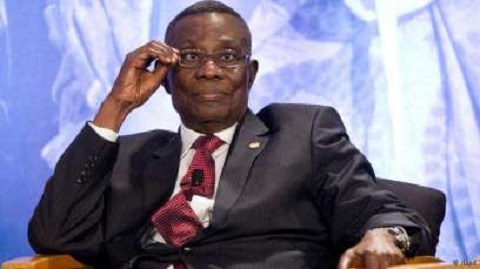
Former President Jerry Rawlings' chosen successor was overwhelmingly voted to lead Ghana's main opposition party into elections in 2004. Former Vice President John Atta Mills (JAM) won 1,116 votes at a National Democratic Congress convention Saturday, compared to just 194 votes for Rawlings' longtime finance minister, Kwesi Botchwey.
Rawlings, who took power in a bloody coup before reconstructing himself as an elected leader, handed over power to longtime rival President John Kufuor after Mills lost at the polls in 2000.
Party critics, who claim Mills is a figurehead for Rawlings' continued political ambitions, rallied around Botchwey in Saturday's vote. Botchwey was a member of Rawlings' government until 1994, when he resigned over a dispute with the former fighter pilot.
Saturday's vote was the first time the party founded by Rawlings selected a leader by secret ballot. On previous occasions, candidates were selected by acclamation.
Mills, who was hand-picked by Rawlings to succeed him in 2000, extended an olive branch to his opponent after the vote, saying they would need to work together to retake power in 2004.
"This victory is not for John Atta Mills, its for the entire NDC, including my opponents," Mills said.
Botchwey conceded defeat and assured Mills of his "total support" in the campaign ahead.
The two leaders — both in their late 50s — are both law lecturers and members of the same Fante tribe of the Akan group, who make up about a third of Ghana's 18 million people.
Rawlings welcomed the result as a "vindication of the truth." He urged party members to set aside their differences and work together to end what he called the misrule of the current government.
Ghana has experienced five military regimes since independence from Britain in 1957. Rawlings first took power in a 1979 coup, handing over power briefly to a civilian leader, before a second coup two years later.
While his regime was marked in the early years by executions and repression, he embraced democratic and free-market ideals in the 1990s, becoming a favorite of Western donors. He won multiparty elections in 1992 and 1996, but was barred by the constitution he approved from seeking another four-year term.
Former President Jerry Rawlings' chosen successor was overwhelmingly voted to lead Ghana's main opposition party into elections in 2004. Former Vice President John Atta Mills (JAM) won 1,116 votes at a National Democratic Congress convention Saturday, compared to just 194 votes for Rawlings' longtime finance minister, Kwesi Botchwey.
Rawlings, who took power in a bloody coup before reconstructing himself as an elected leader, handed over power to longtime rival President John Kufuor after Mills lost at the polls in 2000.
Party critics, who claim Mills is a figurehead for Rawlings' continued political ambitions, rallied around Botchwey in Saturday's vote. Botchwey was a member of Rawlings' government until 1994, when he resigned over a dispute with the former fighter pilot.
Saturday's vote was the first time the party founded by Rawlings selected a leader by secret ballot. On previous occasions, candidates were selected by acclamation.
Mills, who was hand-picked by Rawlings to succeed him in 2000, extended an olive branch to his opponent after the vote, saying they would need to work together to retake power in 2004.
"This victory is not for John Atta Mills, its for the entire NDC, including my opponents," Mills said.
Botchwey conceded defeat and assured Mills of his "total support" in the campaign ahead.
The two leaders — both in their late 50s — are both law lecturers and members of the same Fante tribe of the Akan group, who make up about a third of Ghana's 18 million people.
Rawlings welcomed the result as a "vindication of the truth." He urged party members to set aside their differences and work together to end what he called the misrule of the current government.
Ghana has experienced five military regimes since independence from Britain in 1957. Rawlings first took power in a 1979 coup, handing over power briefly to a civilian leader, before a second coup two years later.
While his regime was marked in the early years by executions and repression, he embraced democratic and free-market ideals in the 1990s, becoming a favorite of Western donors. He won multiparty elections in 1992 and 1996, but was barred by the constitution he approved from seeking another four-year term.